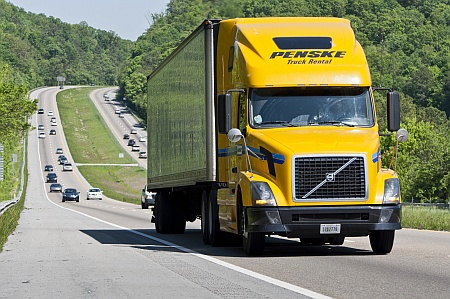Penske expands truck rental operations in Australia
Penske Commercial Vehicles, based in Brisbane, has announced a new joint venture with U.S.-based Penske Trucking Leasing to provide commercial truck rental services in Australia.
The joint venture will operate under the brand name Penske Truck Rental.
The collaboration in Australia combines Penske Truck Leasing’s fleet operations expertise with the market knowledge of Penske Commercial Vehicles. Penske Commercial Vehicles, which operates the Brisbane Truck Centre, is a wholly-owned subsidiary of Penske Automotive Group and has exclusive distribution of MAN and Western Star Trucks in Australia and New Zealand.
“We have an ambitious growth plan for our truck leasing and rental businesses,” said Brian Hard, President and CEO, Penske Truck Leasing, Co., L.P. “This new location will serve as a foundation for us to begin expanding and serving commercial truck fleet customers throughout Australia.”
“We’re excited to bring a new level of customer service as well as quality, well-maintained rental vehicles to Australia’s trucking and logistics industry,” said Adrian Beach, general manager of Penske Commercial Leasing Australia. “We plan to expand rental services into other areas in coming months.”
Penske Truck Rental’s operation in Australia will initially consist of a 20-truck fleet of high-specification MAN and Western Star prime movers. Each unit will be professionally maintained to maximize reliability, fuel efficiency and availability. Penske Truck Rental offers MAN TGS 6×4 prime movers powered by the 540 horsepower MAN turbo diesel coupled to 12-speed Tipmatic transmission along with both Western Star 4864 FS2 and Western Star 4864 FXC prime movers.
The FS2 features a day cab while the FXC is equipped with a sleeper-cab. Both are powered by a 560 horsepower DD15 turbo diesel, coupled to Eaton’s UltraShift Plus transmission.
“To help ensure convenience and productivity all Penske rental trucks are equipped with toll transponders, GPS units, and have full fuel tanks on pick up,” said Beach.
A leading global transportation services provider, Penske operates more than 200,000 vehicles and serves customers from more than 1,000 locations in North America, South America, Europe and Asia. Product lines include full-service truck leasing, contract maintenance, commercial and consumer truck rentals, used truck sales, transportation and warehousing management and supply chain management solutions.
Penske’s joint venture in Australia comes as the country is facing tough economic challenges.
Australia’s misery index – the sum of employment and inflation rates – is at 9.0, the highest since 2008 and the Great Depression.
Australia’s unemployment rate is at a 12-year high of 6.4 percent.
Prime Minister Tony Abbott’s government is cutting jobs and spending and raising taxes to tackle a budget deficit estimated to have swollen to $49.9 billion in June.
Despite the discouraging numbers, Australian businesses are showing a high level of confidence in the economy making a comeback.
Forty-six percent of businesses expect higher sales in the fourth quarter while only nine percent are predicting a fall, according to Dun and Bradstreet’s Business Expectations Survey.
The services sector was the most optimistic about sales in the fourth quarter of the year, followed by the transportation, utilities and construction sector. Retailers also expect a recovery from the recent slump in sales.
Dun & Bradstreet economic adviser Stephen Koukoulas said the surge in business confidence should boost economic growth later in the year.
“The continued resilience in the outlook for employment suggests that the pace of job creation will move to a point where the unemployment rate edges lower over the next couple of quarters,” he said.
The report said that two out of three businesses are more optimistic about increased economic growth in the months ahead, but some parts of the country aren’t so upbeat.
When asked to rate local business conditions, Tasmanian business were the most pessimistic, with 39 per cent saying `very bad’ and only eight per cent saying `very good’.
In Western Australia, more than half of businesses described conditions as `average’.






